确立允诺禁止反言原则案例
[汇总]确立允诺禁止反言原则案例
![[汇总]确立允诺禁止反言原则案例](https://img.taocdn.com/s3/m/4ea6932642323968011ca300a6c30c225901f036.png)
确立允诺禁止反言原则案例CENTRAL LONDON PROPERTY TRUST LIMITED v. HIGH TREES HOUSE LIMITED【编者按】本案确立了允诺的不容否定/允诺禁止反言原则。
原告于1937年将其公寓整幢租给被告,租期99年,每年租金2500英镑;在该租约下,被告再将此公寓分租出去。
1939年二战爆发,伦敦人去楼空,被告承租的的公寓大部分无人问津,因此,原告同意被告的请求将租金减至一半即1250英镑,溯及至契约签订时生效。
1945年二战结束,伦敦人民自乡间返回,被告承租的公寓亦告客满,原告因此要求租金仍以每年2500英镑计算,并补交削减的租金。
法院判决对于原告补交1939年至1945年的少付租金的请求不予支持。
在判决中,丹宁勋爵说,“如债权人对债务人已表示接受少数数目以清偿较大数目之债务,经债务人业已依约履行,纵债务人未给予债权人其他的酬劳或约因,此项约定即生效力,禁止债权人再违反先前之允诺。
”由此可见,这条新原则旨在保护那些信赖他人允诺的人,即使他们对允诺没有提供过约因。
按约因原则,相互性是允诺能申请强制执行的唯一依据,本案判例则说明,信赖同样可以使允诺成为可以强制执行的。
--------------------------------------------------------------------------------1946 July 18. Denning J.Contract - Agreement intended to create legal relations - Promise made thereunder - Knowledge of promisor that promisee will act on promise - Promise acted on - Enforceability of agreement without strict consideration - Agreement under seal- Variation of by agreement of lesser value - Estoppel.By a lease under seal dated September 24, 1937, the plaintiff company let to the defendant company (a subsidiary of the plaintiffs) a block of flats for a term of ninety-nine years from September 29, 1937, at a ground rent of 2,500l. a year. In the early part of 1940, owing to war conditions then prevailing, only a few of the flats in the block were let to tenants and it became apparent that the defendants would be unable to pay the rent reserved by the lease out of the rents of the flats. Discussions took place between the directors of the two companies, which were closely connected, and, as a result, on January 3, 1940, a letter was written by the plaintiffs to the defendants confirming that the ground rent of the premises would be reduced from 2,500l. to 1,250l. as from the beginning of the term. The defendants thereafter paid the reduced rent. By the beginning of 1945 all the flats were let but the defendants continued to pay only the reduced rent. In September, 1945, the plaintiffs wrote to the defendants claiming that rent was payable at the rate of 2,500l. a year and, subsequently, in order to determine the legal position, they initiated friendly proceedings in which they claimed the difference between rent at the rates of 2,500l. and 1,250l. for the quarters ending September 29 and December 25, 1945. By their defence the defendants pleaded that the agreement for the reduction of the ground rent operated during the whole term of the lease and, as alternatives, that the plaintiffs were estopped from demanding rent at the higher rate or had waived their right to do so down to the date of their letter of September 21, 1945.Held (1.) that where parties enter into an arrangement which is intended to create legal relations between them and in pursuance of such arrangement one party makes a promise to the other which he knows will be acted on and which is in fact acted on by the promisee, the court will treat the promise as binding on the promisor to the extent that it will not allow him to act inconsistently with it even although the promise may not be supported by consideration in the strict sense and the effect of the arrangement made is to vary the terms of a contract under seal by one of less value; and(2.) that the arrangement made between the plaintiffs and the defendants in January, 1940, was one which fell within the above category and, accordingly, that the agreement for the reduction of the ground rent was binding on the plaintiff company, but that it only remained operative so long as the conditions giving rise to it continued to exist and that on their ceasing to do so in 1945 the plaintiffs were entitled to recover the ground rent claimed at the rate reserved by the lease.ACTION tried by Denning J.By a lease under seal made on September 24, 1937, the plaintiffs, Central London Property Trust Ld., granted to the defendants, High Trees House Ld., a subsidiary of the plaintiff company, a tenancy of a block of flats for the term of ninety-nine years from September 29, 1937, at a ground rent of 2,500l. a year. The block of flats was a new one and had not been fully occupied at the beginning of the war owing to theabsence of people from London. With war conditions prevailing, it was apparent to those responsible that the rent reserved under the lease could not be paid out of the profits of the flats and, accordingly, discussions took place between the directors of the two companies concerned, which were closely associated, and an arrangement was made between them which was put into writing. On January 3, 1940, the plaintiffs wrote to the defendants in these terms, "we confirm the arrangement made between us by which the ground rent should be reduced as from the commencement of the lease to 1,250l. per annum," and on April 2, 1940, a confirmatory resolution to the same effect was passed by the plaintiff company. On March 20, 1941, a receiver was appointed by the debenture holders of the plaintiffs and on his death on February 28, 1944, his place was taken by his partner. The defendants paid the reduced rent from 1941 down to the beginning of 1945 by which time all the flats in the block were fully let, and continued to pay it thereafter. In September, 1945, the then receiver of the plaintiff company looked into the matter of the lease and ascertained that the rent actually reserved by it was 2,500l. On September 21, 1945, he wrote to the defendants saying that rent must be paid at the full rate and claiming that arrears amounting to 7,916l. were due. Subsequently, he instituted the present friendly proceedings to test the legal position in regard to the rate at which rent was payable. In the action the plaintiffs sought to recover 625l., being the amount represented by the difference between rent at the rate of 2,500l. and 1,250l. per annum for the quarters ending September 29, and December 25, 1945. By their defence the defendants pleaded (1.) that the letter of January 3, 1940, constituted an agreement that the rent reserved should be 1,250l. only, and that such agreement related to the wholeterm of the lease, (2.) they pleaded in the alternative that the plaintiff company were estopped from alleging that the rent exceeded 1,250l. per annum and (3.) as a further alternative, that by failing to demand rent in excess of 1,250l. before their letter of September 21, 1945 (received by the defendants on September 24), they had waived their rights in respect of any rent, in excess of that at the rate of 1,250l., which had accrued up to September 24, 1945.Fortune for the plaintiffs. The plaintiffs are entitled to recover rent on the basis of it being at the rate of 2,500l.a year, the amount reserved by the lease. The document in question was under seal and consequently could not be varied by a parol agreement or an agreement in writing not under seal. If there was a fresh agreement, it was void since it was made without consideration and in any event it was only an agreement of a purely temporary character necessitated by the difficult conditions prevailing when it was made, and coming to an end when those conditions ceased to exist at the end of 1944 or the beginning of 1945. Even supposing that the plaintiffs were held to be estopped from denying the existence of a new agreement, such estoppel would only operate so long as the conditions giving rise to the arrangement on which the estoppel was based, continued. [Denning J. This subject was considered by Simonds J. in Re William Porter & Co., Ld. [1937] 2 All E. R. 361.] It has recently been considered by Humphreys J. in Buttery v. Pickard [1946] W. N. 25. He also referred to Forquet v. Moore (1852) 22 L. J. (Ex.) 35, Crowley and Others v. Vitty (1852)21 L. J. (Ex.) 135 and Foa, Landlord and Tenant, 6th ed., p. 701.Ronald Hopkins for the defendants. The company are only liable to pay rent at the rate of 1,250l. per annum. The letters passing between the parties and the entry in the minute book of the plaintiff company constitute evidence of an agreement, which, although possibly not supported by such consideration as would strictly be necessary at common law, was of a type which a court of equity would enforce if it were satisfied that the parties intended to give contractual efficacy to that to which they were agreeing. The reduction in rent was made so that the defendants might be enabled to continue to run their business and that was sufficient to enable a court to hold the agreement binding on the plaintiff company. With regard to the variation of an agreement under seal by a parol agreement or an agreement in writing, in Berry v. Berry [1929] 2 K. B. 316, 319, Swift J. said it was true that a covenant could not be varied except by some contract of equal value, but, he continued "although that was the rule of law, the courts of equity have always held themselves at liberty, to allow the rescission or variation by a simple contract of a contract under seal by preventing the party who has agreed to the rescission or variation from suing under the deed. In Nash v. Armstrong (1861) 10 C. B. (N. S.)259 it was held that a parol agreement not to enforce performance of a deed and to substitute other terms for some of its covenants was a good consideration for a promise to perform the substituted contract ……" If the above co ntentions fail, the defendants rely on the doctrine of estoppel, The propositions of law laid down in Re William Porter & Co., Ld. [1937] 2 All E. R. 361 exactly apply to the present case. The reduction in the rent was made in order that the defendants might be able to carry on their business. As a result of the reduction the business was carried on and the defendantsarranged their affairs on the basis of the reduced rent with the result that the plaintiffs are estopped from claiming any rent beyond 1,260l. per annum for the whole period of the lease. Finally, the letters passing between the parties constituted a waiver by the plaintiffs of their right to a higher rent than 1,250l. down to the date of their letter of September 21, 1945.Fortune in reply.DENNING J.stated the facts and continued: If I were to consider this matter without regard to recent developments in the law, there is no doubt that had the plaintiffs claimed it, they would have been entitled to recover ground rent at the rate of 2,500l. a year from the beginning of the term, since the lease under which it was payable was a lease under seal which, according to the old common law, could not be varied by an agreement by parol (whether in writing or not), but only by deed. Equity, however stepped in, and said that if there has been a variation of a deed by a simple contract (which in the case of a lease required to be in writing would have to be evidenced by writing), the courts may give effect to it as is shown in Berry v. Berry [1929] 2 K. B. 316. That equitable doctrine, however, could hardly apply in the present case because the variation here might be said to have been made without consideration. With regard to estoppel, the representation made in relation to reducing the rent, was not a representation of an existing fact. It was a representation, in effect, as to the future, namely, that payment of the rent would not be enforced at the full rate but only at the reduced rate. Such a representation would not give rise to an estoppel,because, as was said in Jorden v. Money (1854) 5 H. L. C. 185, a representation as to the future must be embodied as a contract or be nothing.But what is the position in view of developments in the law in recent years? The law has not been standing still since Jorden v. Money (1854) 5 H. L. C. 185. There has been a series of decisions over the last fifty years which, although they are said to be cases of estoppel are not really such. They are cases in which a promise was made which was intended to create legal relations and which, to the knowledge of the person making the promise, was going to be acted on by the person to whom it was made and which was in fact so acted on. In such cases the courts have said that the promise must be honoured. The cases to which I particularly desire to refer are: Fenner v. Blake [1900] 1 Q. B. 426, In re Wickham (1917) 34 T. L. R. 158, Re William Porter & Co., Ld. [1937] 2 All E. R. 361 and Buttery v. Pickard [1946] W. N. 25. As I have said they are not cases of estoppel in the strict sense. They are really promises - promises intended to be binding, intended to be acted on, and in fact acted on. Jorden v. Money (1854) 5 H. L. C. 185 can be distinguished, because there the promisor made it clear that she did not intend to be legally bound, whereas in the cases to which I refer the proper inference was that the promisor did intend to be bound. In each case the court held the promise to be binding on the party making it, even though under the old common law it might be difficult to find any consideration for it. The courts have not gone so far as to give a cause of action in damages for the breach of such a promise, but they have refused to allow the party making it to act inconsistently with it. It is in that sense, and that sense only, that such a promisegives rise to an estoppel. The decisions are a natural result of the fusion of law and equity: for the cases of Hughes v. Metropolitan Ry. Co. (1877) 2 App. Cas. 439, 448, Birmingham and District Land Co. v. London & North Western Ry. Co. (1888)40 Ch. D. 268, 286 and Salisbury (Marquess) v. Gilmore [1942] 2 K. B. 38, 51, afford a sufficient basis for saying that a party would not be allowed in equity to go back on such a promise. In my opinion, the time has now come for the validity of such a promise to be recognized. The logical consequence, no doubt is that a promise to accept a smaller sum in discharge of a larger sum, if acted upon, is binding notwithstanding the absence of consideration: and if the fusion of law and equity leads to this result, so much the better. That aspect was not considered in Foakes v. Beer (1884) 9 App. Cas. 605. At this time of day however, when law and equity have been joined together for over seventy years, principles must be reconsidered in the light of their combined effect. It is to be noticed that in the Sixth Interim Report of the Law Revision Committee, pars. 35, 40, it is recommended that such a promise as that to which I have referred, should be enforceable in law even though no consideration for it has been given by the promisee. It seems to me that, to the extent I have mentioned that result has now been achieved by the decisions of the courts.I am satisfied that a promise such as that to which I have referred is binding and the only question remaining for my consideration is the scope of the promise in the present case.I am satisfied on all the evidence that the promise here was that the ground rent should be reduced to 1,250l. a year as a temporary expedient while the block of flats was not fully, orsubstantially fully let, owing to the conditions prevailing. That means that the reduction in the rent applied throughout the years down to the end of 1944, but early in 1945 it is plain that the flats were fully let, and, indeed the rents received from them (many of them not being affected by the Rent Restrictions Acts), were increased beyond the figure at which it was originally contemplated that they would be let. At all events the rent from them must have been very considerable. I find that the conditions prevailing at the time when the reduction in rent was made, had completely passed away by the early months of 1945. I am satisfied that the promise was understood by all parties only to apply under the conditions prevailing at the time when it was made, namely, when the flats were only partially let, and that it did not extend any further than that. When the flats became fully let, early in 1945, the reduction ceased to apply.In those circumstances, under the law as I hold it, it seems to me that rent is payable at the full rate for the quarters ending September 29 and December 25, 1945.If the case had been one of estoppel, it might be said that in any event the estoppel would cease when the conditions to which the representation applied came to an end, or it also might be said that it would only come to an end on notice. In either case it is only a way of ascertaining what is the scope of the representation. I prefer to apply the principle that a promise intended to be binding, intended to be acted on and in fact acted on, is binding so far as its terms properly apply. Here it was binding as covering the period down to the early part of 1945, and as from that time full rent is payable.I therefore give judgment for the plaintiff company for the amount claimed.Judgment for plaintiffs.Solicitors for the plaintiffs: Henry Boustred & Sons.Solicitors for the defendants: Callingham, Griffith & Bates.。
Promissory Estoppel允诺禁反言

Promissory Estoppel所谓“允诺禁反言” (Promissory Estoppel),是英美法系国家的一般契约理论,其基本内涵是“My word is my bond”-言行一致,不得出尔反尔。
“允诺禁反言”原则在英国得以确立也颇费曲折。
英美法系国家传统的合同理论是:合同成立、变更均须有约因(对价)(consideration),才能产生强制执行之效力。
可是实践中大量存在着这样的现象:某人许诺赠与他人物品或答应他人无偿为其做某事,但不久又反悔而使受诺人遭受损失。
受诺人受到损失后却无法律依据阻却权利人权利的行使。
20世纪40年代以前,英美法系国家的法官解决这一问题的方法,使法律天平平衡的砝码,一是在衡平法上采用允诺禁反言,再是尽其所能寻找有效的约因。
这种方法往往产生牵强附会,徒增了人们对法律公正性的怀疑。
1877年英国法官卡恩斯勋爵(Lord Cairns)审理Hughes V .Metropolitan Railway Co.案时就提出了允诺禁止反言的观念,但并未引起人们的重视。
直至1947年,卡恩斯勋爵的观念被英国大法官丹宁(Lord Denning)传承,并将其确立为一个法律原则。
1947年,英国大法官丹宁审理High trees一案。
该案的案情是:原告于1934年将伦敦的一套公寓楼租给被告,租期为99年,从1937年起算,租金为每年2500英镑。
被告租房后将房屋转租。
1939第二次世界大战年爆发,很多人离开伦敦,房客很少,被告无力支付房租,原被告双方于1940年11月协商同意将租金减半,但未说明租金减半的期限。
1945年,第二次世界大战结束,客源大增,原告希望恢复原先确定的房租价格。
为了向法院了解他们是否有权这样做,原告起诉,要求被告从1945年下半年开始按1937年确定的租金水平交纳租金。
理由是,被告并没有为降低房租的协议提供约因。
丹宁大法官指出,降租协议是基于战时特殊情况而达成的,显然不能适用于整个99年租期。
国际法上的禁反言原则
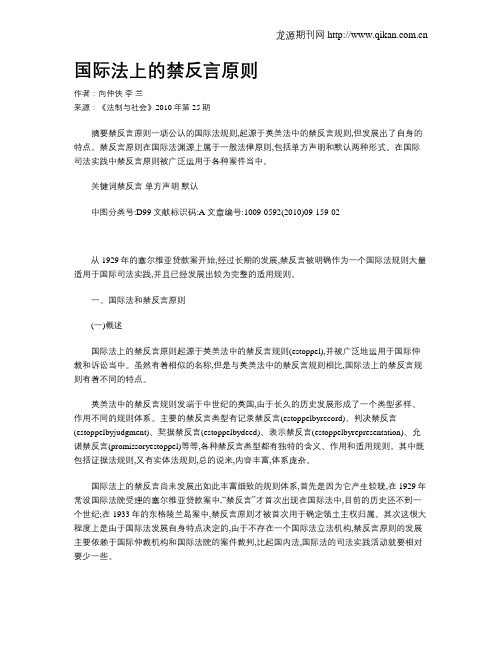
国际法上的禁反言原则作者:向仲侠李兰来源:《法制与社会》2010年第25期摘要禁反言原则一项公认的国际法规则,起源于英美法中的禁反言规则,但发展出了自身的特点。
禁反言原则在国际法渊源上属于一般法律原则,包括单方声明和默认两种形式。
在国际司法实践中禁反言原则被广泛运用于各种案件当中。
关键词禁反言单方声明默认中图分类号:D99 文献标识码:A 文章编号:1009-0592(2010)09-159-02从1929年的塞尔维亚贷款案开始,经过长期的发展,禁反言被明确作为一个国际法规则大量适用于国际司法实践,并且已经发展出较为完整的适用规则。
一、国际法和禁反言原则(一)概述国际法上的禁反言原则起源于英美法中的禁反言规则(estoppel),并被广泛地运用于国际仲裁和诉讼当中。
虽然有着相似的名称,但是与英美法中的禁反言规则相比,国际法上的禁反言规则有着不同的特点。
英美法中的禁反言规则发端于中世纪的英国,由于长久的历史发展形成了一个类型多样、作用不同的规则体系。
主要的禁反言类型有记录禁反言(estoppelbyrecord)、判决禁反言(estoppelbyjudgment)、契据禁反言(estoppelbydeed)、表示禁反言(estoppelbyrepresentation)、允诺禁反言(promissoryestoppel)等等,各种禁反言类型都有独特的含义、作用和适用规则。
其中既包括证据法规则,又有实体法规则,总的说来,内容丰富,体系庞杂。
国际法上的禁反言尚未发展出如此丰富细致的规则体系,首先是因为它产生较晚,在1929年常设国际法院受理的塞尔维亚贷款案中,“禁反言”才首次出现在国际法中,目前的历史还不到一个世纪;在1933年的东格陵兰岛案中,禁反言原则才被首次用于确定领土主权归属。
其次这很大程度上是由于国际法发展自身特点决定的,由于不存在一个国际法立法机构,禁反言原则的发展主要依赖于国际仲裁机构和国际法院的案件裁判,比起国内法,国际法的司法实践活动就要相对要少一些。
“允诺禁反言”原则论(一)
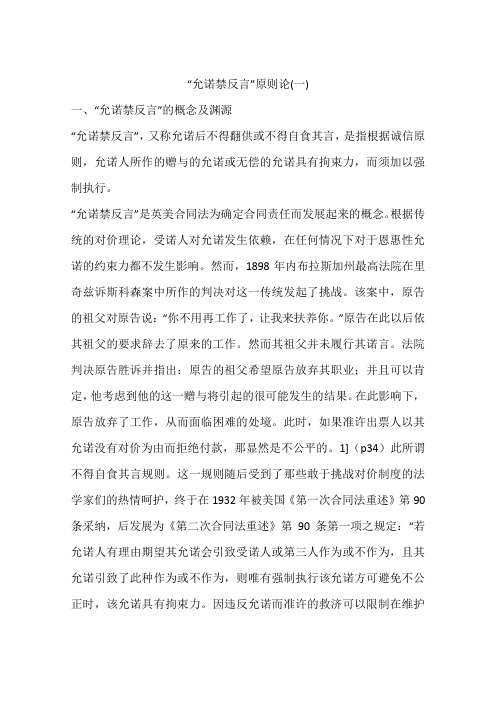
“允诺禁反言”原则论(一)一、“允诺禁反言”的概念及渊源“允诺禁反言”,又称允诺后不得翻供或不得自食其言,是指根据诚信原则,允诺人所作的赠与的允诺或无偿的允诺具有拘束力,而须加以强制执行。
“允诺禁反言”是英美合同法为确定合同责任而发展起来的概念。
根据传统的对价理论,受诺人对允诺发生依赖,在任何情况下对于恩惠性允诺的约束力都不发生影响。
然而,1898年内布拉斯加州最高法院在里奇兹诉斯科森案中所作的判决对这一传统发起了挑战。
该案中,原告的祖父对原告说:“你不用再工作了,让我来扶养你。
”原告在此以后依其祖父的要求辞去了原来的工作。
然而其祖父并未履行其诺言。
法院判决原告胜诉并指出:原告的祖父希望原告放弃其职业;并且可以肯定,他考虑到他的这一赠与将引起的很可能发生的结果。
在此影响下,原告放弃了工作,从而面临困难的处境。
此时,如果准许出票人以其允诺没有对价为由而拒绝付款,那显然是不公平的。
1](p34)此所谓不得自食其言规则。
这一规则随后受到了那些敢于挑战对价制度的法学家们的热情呵护,终于在1932年被美国《第一次合同法重述》第90条采纳,后发展为《第二次合同法重述》第90条第一项之规定:“若允诺人有理由期望其允诺会引致受诺人或第三人作为或不作为,且其允诺引致了此种作为或不作为,则唯有强制执行该允诺方可避免不公正时,该允诺具有拘束力。
因违反允诺而准许的救济可以限制在维护公正所需的范围内。
”英国确立“允诺禁反言”原则的典型判例是丹宁大法官所作的高树案判决。
此案中,原告于1937年将其公寓全幢租与被告,年租金2500英镑。
被告遂将此公寓分租出去。
但1939年二战爆发,被告承租的公寓大部分闲置,因而在1940年原告同意被告请求将年租金减少一半。
1945年二战结束,被告承租的公寓客满。
原告因此要求被告自1945年公寓客满后补缴租金。
丹宁法官判决原告胜诉,确立了“允诺禁反言”规则,即“如债权人对债务人表示接受少数数目以清偿较大数目之债务,经债务人业已依约履行,纵债务人未给予债权人其他酬劳或对价,此项约定即生效力,禁止债权人再违反先前之允诺。
教育部曝光的违法言行雅正要求的案例
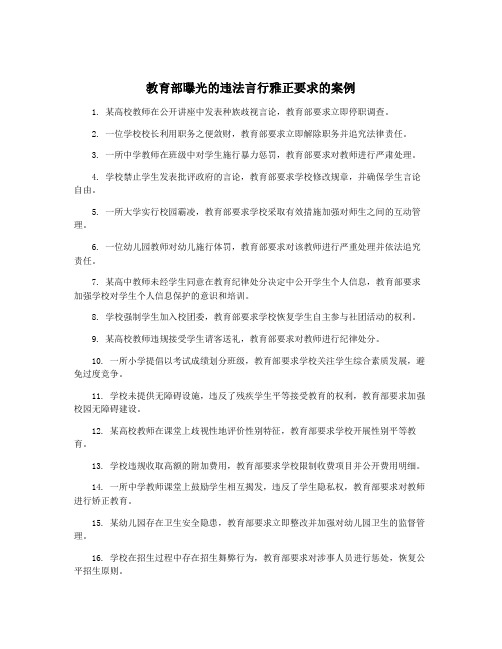
教育部曝光的违法言行雅正要求的案例1. 某高校教师在公开讲座中发表种族歧视言论,教育部要求立即停职调查。
2. 一位学校校长利用职务之便敛财,教育部要求立即解除职务并追究法律责任。
3. 一所中学教师在班级中对学生施行暴力惩罚,教育部要求对教师进行严肃处理。
4. 学校禁止学生发表批评政府的言论,教育部要求学校修改规章,并确保学生言论自由。
5. 一所大学实行校园霸凌,教育部要求学校采取有效措施加强对师生之间的互动管理。
6. 一位幼儿园教师对幼儿施行体罚,教育部要求对该教师进行严重处理并依法追究责任。
7. 某高中教师未经学生同意在教育纪律处分决定中公开学生个人信息,教育部要求加强学校对学生个人信息保护的意识和培训。
8. 学校强制学生加入校团委,教育部要求学校恢复学生自主参与社团活动的权利。
9. 某高校教师违规接受学生请客送礼,教育部要求对教师进行纪律处分。
10. 一所小学提倡以考试成绩划分班级,教育部要求学校关注学生综合素质发展,避免过度竞争。
11. 学校未提供无障碍设施,违反了残疾学生平等接受教育的权利,教育部要求加强校园无障碍建设。
12. 某高校教师在课堂上歧视性地评价性别特征,教育部要求学校开展性别平等教育。
13. 学校违规收取高额的附加费用,教育部要求学校限制收费项目并公开费用明细。
14. 一所中学教师课堂上鼓励学生相互揭发,违反了学生隐私权,教育部要求对教师进行矫正教育。
15. 某幼儿园存在卫生安全隐患,教育部要求立即整改并加强对幼儿园卫生的监督管理。
16. 学校在招生过程中存在招生舞弊行为,教育部要求对涉事人员进行惩处,恢复公平招生原则。
17. 一所高校未能给予贫困学生及时的资助,教育部要求学校加强资助体系建设并保证贫困生权益。
18. 学校强制学生进行身份证复印,教育部要求学校改变政策并保护学生个人信息安全。
19. 某中学存在不合理的校规限制,限制了学生的个人发展,教育部要求对校规进行修订。
英国法上的允诺禁反悔

作者: 朱广新
作者机构: 《中国法学》杂志社编辑,法学博士
出版物刊名: 比较法研究
页码: 92-108页
主题词: 英国法 House 合同法 High 汤普森 弗雷德 阿普尔 学者
摘要:英国学者经常提及的允诺禁反悔制度(规则或学说)由该国著名法官艾尔弗雷德·汤普森·丹宁(Alfred Thompson Denning,1899—1999)在Centrall London Property Trust Ltd.v.Hish Trees House Ltd(1947)案(以下简称Hish Trees案)中所确立。
英国当代合同法学者乔治·阿普尔比(George Applebey)就此评价说:“在现代英国合同法上,信赖理论的最为清楚的范例是允诺禁反悔规则。
当允诺禁反悔于1946年(在1947年被报告)在丹宁里程碑式的High Trees案判决中呈现于世人时,合同法进入了一个新时代。
”。
论英国法上的允诺禁反言原则
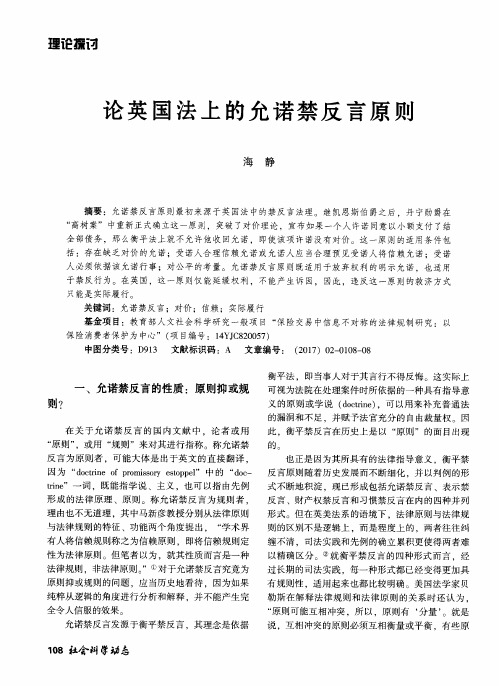
也正是 因为其 所具有 的法律指导 意义 ,衡平禁 反言原则 随着 历史发展 而不 断细化 ,并 以判例 的形
t r i n e ”一词 ,既能指 学说 、主义 ,也 可 以指 由先 例
形 成 的法律原 理 、原则 。称允诺 禁 反言 为规则 者 , 理 由也 不无道理 ,其 中马新彦 教授分别从 法律原则 与法律 规则 的特 征 、功能两个 角度提 出 , “ 学术 界
综 上所述 ,国外论著 以 “ d o c t r i n e ”指称允诺 禁 反 言 ,实际上是要 强调其本 身具有 的价值和正 义矫 正功 能 。体现 了其 对普通法 的补正与 指导意义 .但
由于适用时往往产生实体法的效力从而发展为实体法其实体法原则成形于表示禁反言estoppelbyrepresentation指当事人一方以言辞行为默认沉默等表示方式或者因其故意或过失使他方当事人相信某重要事实存在或不存在并据此为一定行为时为防止他方当事人蒙受损失法律禁止引起信赖的当事人否认其表示的事实
法律规则 ,非法律原 则 。 ”① 对 于允诺 禁反言究竟 为
原则抑 或规则 的问题 ,应 当历 史地看待 ,因为如果 纯粹从 逻辑 的角度 进行分析 和解释 ,并不 能产生完
全令人信服 的效果 。 允诺禁 反言发源 于衡平禁反 言 ,其理念 是依据
“ 原 则可能互 相冲突 ,所 以 ,原则有 ‘ 分量’ 。就是
的。
则?
在 关 于 允诺 禁 反 言 的 国 内文 献 中 ,论 者 或 用 “ 原 则” ,或用 “ 规则 ”来对其 进行指称 。称允诺禁
反 言为 原则者 ,可 能大体 是 出于英 文 的直接 翻译 ,
因为 “ d o c t r i n e o f p r o m i s s o r y e s t o p p e l ”中的 “ d o c —
前后意思表达不一致,最高法院直接运用禁止反言原则作判决
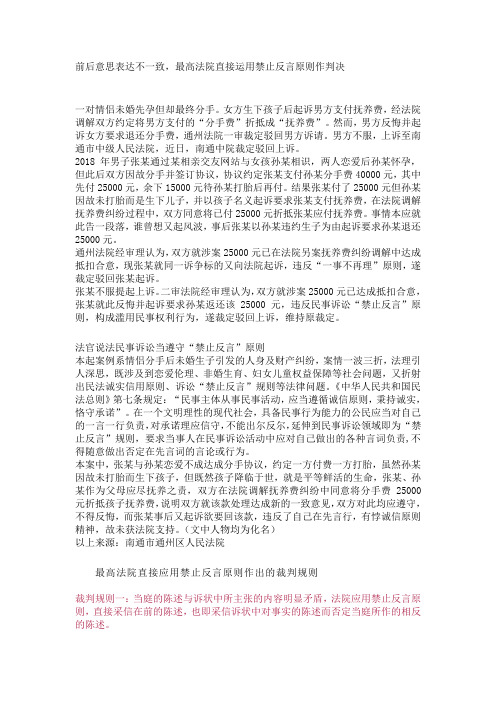
前后意思表达不一致,最高法院直接运用禁止反言原则作判决一对情侣未婚先孕但却最终分手。
女方生下孩子后起诉男方支付抚养费,经法院调解双方约定将男方支付的“分手费”折抵成“抚养费”。
然而,男方反悔并起诉女方要求退还分手费,通州法院一审裁定驳回男方诉请。
男方不服,上诉至南通市中级人民法院,近日,南通中院裁定驳回上诉。
2018年男子张某通过某相亲交友网站与女孩孙某相识,两人恋爱后孙某怀孕,但此后双方因故分手并签订协议,协议约定张某支付孙某分手费40000元,其中先付25000元,余下15000元待孙某打胎后再付。
结果张某付了25000元但孙某因故未打胎而是生下儿子,并以孩子名义起诉要求张某支付抚养费,在法院调解抚养费纠纷过程中,双方同意将已付25000元折抵张某应付抚养费。
事情本应就此告一段落,谁曾想又起风波,事后张某以孙某违约生子为由起诉要求孙某退还25000元。
通州法院经审理认为,双方就涉案25000元已在法院另案抚养费纠纷调解中达成抵扣合意,现张某就同一诉争标的又向法院起诉,违反“一事不再理”原则,遂裁定驳回张某起诉。
张某不服提起上诉。
二审法院经审理认为,双方就涉案25000元已达成抵扣合意,张某就此反悔并起诉要求孙某返还该25000元,违反民事诉讼“禁止反言”原则,构成滥用民事权利行为,遂裁定驳回上诉,维持原裁定。
法官说法民事诉讼当遵守“禁止反言”原则本起案例系情侣分手后未婚生子引发的人身及财产纠纷,案情一波三折,法理引人深思,既涉及到恋爱伦理、非婚生育、妇女儿童权益保障等社会问题,又折射出民法诚实信用原则、诉讼“禁止反言”规则等法律问题。
《中华人民共和国民法总则》第七条规定:“民事主体从事民事活动,应当遵循诚信原则,秉持诚实,恪守承诺”。
在一个文明理性的现代社会,具备民事行为能力的公民应当对自己的一言一行负责,对承诺理应信守,不能出尔反尔,延伸到民事诉讼领域即为“禁止反言”规则,要求当事人在民事诉讼活动中应对自己做出的各种言词负责,不得随意做出否定在先言词的言论或行为。
高树案

在高树案中,原告提出,根据1602年“平内尔案”所确立的原则,债权人对债务人偿还部分欠款抵销全部债务的允诺无效,因为债务人并未对此提出约因。因此原告有权恢复原租金,并追偿1939年到1945年公寓闲置时少收的租金。但是,丹宁勋爵认为,原告有权在战争结束后将租金恢复到原来的水平,然而,“平内尔原则”在本案中不适用。在战争期间,承租人相信了原告的承诺继续住了下去。原告怎么能在降低租金,鼓励承租人们留下,在他们相应地调整了开支与收入之后自食其言呢?丹宁勋爵根据衡平法的基本原则,进一步提出了“允诺禁反言原则”,即“如果债权人对债务人已表示接受少数数目以清偿较大数目之债务,经债务人业已履行,纵债务人未给予债权人其他之酬劳或约因,此项约定即生效力,禁止债权人再违反先前之允诺。”所以,原告无权追偿战争期间少收的二分之一租金。
高树案
[大] [中] [小]发布人:圣才学习网发布日期:2008-10-29 08:22共841人浏览
英美合同法上的“允诺禁反言”原则及其对我国的借鉴(付春明 李晓琳)

英美合同法上的“允诺禁反言”原则及其对我国的借鉴付春明李晓琳上传时间:2004-6-4[摘要] 英美法系属判例法,普通法与衡平法是其两大支柱。
就合同法而言,英美法的传统合同理论的基石系普通法上之对价理论,随社会变迁,以对价为基础的合同理论时有见肘,甚至造成不公平现象。
为弥补传统合同理论之不足,衡平法上发展出“允诺禁反言”原则,完善了英美合同法理论。
“允诺禁反言”原则与大陆法系的缔约过失制度有相似之处,但更多的是不同,并有互补之作用。
我国主要承袭大陆法系,借鉴英美合同法上的“允诺禁反言”原则实可丰富我国合同法理论,也可在司法实务中贯彻公平正义。
[关键词] 合同法、允诺禁反言、缔约过失责任、借鉴大凡人们参与私法生活,期能补生活资源之不足,缘此而缔结合同,相互交换、互为买卖,最重者为“重然诺”,以诚信为本。
但亦有轻信诺之人,率而废约,致他人未能达其缔约目的,且常有损失。
此态样既不利于社会经济之发展,也不利于当事人之保护,亦与公平正义之私法理念相悖。
此种情形,在英美合同法上,传统对价理论或有为之束手,因而睿智之法学家创设“允诺禁反言”制度,裨能补对价理论之不足。
一、英美合同法上的“允诺禁反言”原则传统英美合同理论之基石为对价理论。
所谓对价,即“有价值之约因乃由契约当事人各方,为迫使对方实现其行为或履行其诺言作出许诺之行为或牺牲,或只为购买或换取对方许诺而支付之代价者”。
[1]简言之,业已成立的合同在生效过程中能够用以支持当事人之间有互为给付义务者,用一句十分通俗的话就是“我给你是为了你给了我的关系”。
约因(对价)是英美法系中合同成立的重要要件,无对价(约因)的合同是得不到法律保护的。
然而,随着社会和经济的迅速变迁发展,新的社会价值观的形成,对价交换理论对合同范围及合同责任的限制的弊端日益突出。
“允诺禁反言”原则正是适时应变、顺应实现实质正义、公平的社会观念发展起来的,由此使长期受对价交换理论排斥的信任、公平等因素重新受到了重视。
2023年南通法院行政审判典型案例

2023年南通法院行政审判典型案例文章属性•【公布机关】江苏省南通市中级人民法院,江苏省南通市中级人民法院,江苏省南通市中级人民法院•【公布日期】2023.04.23•【分类】其他正文2023年南通法院行政审判典型案例2024年4月23日,南通市中级人民法院召开新闻发布会,向社会发布了《2023年南通法院行政审判工作报告》及典型案例。
现将典型案例予以发布。
1.宋某某诉某镇人民政府要求履行行政允诺案——行政允诺的约束力应结合具体内容判断【裁判要旨】行政允诺通常是行政机关在法律规范之外所作的自主选择,对于是否必须履行需要结合内容的合法性、权利义务的对等性、兑现的可行性等因素,分析和判断对行政机关的约束力。
无条件的行政允诺并未对相对人设定对价和条件,无法体现权利与义务的一致性,虽然值得鼓励和倡导,但不宜直接与强制义务划等号。
当行政机关有正当理由拒绝履行时,应当得到尊重和支持。
【基本案情】宋某某与某镇政府签订《房屋拆除搬迁安置补偿协议》并办理腾房交接手续,镇政府制定的《安置房统建房价格调整表》备注“在所安置区域附近,按每家拆迁户一分左右菜地标准建设幸福菜地”。
此后,镇政府决定在某小区先行试点“幸福菜园”,主要内容为:拆迁户可以自愿报名,每户划分一分菜地,菜地租金按159元/年收取,菜地不得私自转让。
如不再种植,菜地由政府收回。
公告发布后,报名人数较少,报名获取菜地的人员因管理问题未再租赁。
宋某某认为某镇政府未按照允诺分配菜地提起诉讼,请求判决镇政府为宋某某在安置区域附近安排一分左右的菜地。
【裁判结果】生效判决认为,尽管镇政府作出了安排菜地的允诺,但并未对拆迁对象设定特殊义务,属于无条件的允诺。
该项允诺是否构成镇政府必须履行的一项义务,需结合履行允诺的可行性进行评判。
镇政府经试点发现安排菜地的允诺不具有可行性,法院不应以法律手段要求镇政府必须为宋某某安排菜地,遂判决驳回宋某某的诉讼请求。
【典型意义】随着加快建设服务型政府理念的深入,行政机关出台的服务政策或措施呈现出多领域、多样化的特征。
盐城法院弘扬社会主义核心价值观十大典型案例

盐城法院弘扬社会主义核心价值观十大典型案例文章属性•【公布机关】江苏省盐城市中级人民法院,江苏省盐城市中级人民法院,江苏省盐城市中级人民法院•【公布日期】2020.12.07•【分类】新闻发布会正文盐城法院弘扬社会主义核心价值观十大典型案例案例一:公厕摔倒索赔案【弘扬的价值】公平正义。
在涉及经营场所、公共场所的侵权案件中,往往容易忽视经营者、管理人“安全保障义务”的边界。
本案中,原告王某作为具有完全民事行为能力的自然人,其在酒后如厕过程中因自身原因摔倒受伤,公厕管理人尽到了安全保障义务,不存在履行安全保障义务的瑕疵,不应承担赔偿责任,人民法院对其诉讼请求不予支持。
【基本案情】2017年5月某日晚上9时30分左右,原告王某酒后到某公共厕所“方便”时滑倒受伤,伤情诊断为:重型颅脑外伤、左颞骨骨折、颅底骨折等,经鉴定构成人体损伤九级伤残。
案涉公厕是公共设施,免费使用,其管理人某市环境卫生管理处负责派人每天正常保洁,保洁时间6:00——9:30,14:30——17:30。
原告王某认为被告某市环境卫生管理处等未尽到安全保障义务,向亭湖法院提起诉讼要求被告赔偿残疾赔偿金、误工费等相关损失合计387958.91元。
【裁判结果】亭湖法院经审理认为,王某酒后在公厕摔倒受伤花费巨额医疗费,其遭遇令人同情。
但是,不能仅因其在公厕受伤,即要求被告承担赔偿责任。
案涉公共厕所是公共设施,被告已尽到正常、合理的保洁及安全保障义务。
原告作为完全民事行为能力人,应当注意自身安全,其酒后去厕所不小心摔倒致伤,是造成事故的直接原因,由此造成的损失应由原告自行承担。
故判决驳回原告的诉讼请求。
原告不服提起上诉,盐城中院二审驳回上诉,维持原判。
【典型意义】本案判决准确界定了公共场所管理人“安全保障义务”的合理边界,将安全保障义务的内容确定在管理人的管理和控制能力范围内,明确了“自己责任自己担责”的基本原则。
完全民事行为能力人应系自身安危的第一责任人,不能让不构成侵权的他人承担责任。
法理学经典案例

一、肯定性行动中的公平问题加利福尼亚大学董事诉巴基案(Regents of University of California v. Bakke, 438 U.S.265 1978)加利福尼亚大学戴维斯分校医学院在20世纪70年代出台了一项入学录取政策,该政策在100个入学名额中,为特定的少数族裔学生,如黑人、亚裔人、印第安人等,预留了16个席位。
巴基是一名白人男性,在1973年和1974年,他连续两年申请加州大学戴维斯分校医学院都被拒绝,这时他发现,在被使用预留名额录取的少数族裔的学生中,有些人的“医学院入学考试”(Medical College Admission Test, MCAT)成绩“明显地低于”他自己的成绩,遂将加州大学告上法庭。
初审法院认为该医学院的入学政策违反了联邦宪法和州宪法,但拒绝颁布使巴基入学的命令。
加州大学和巴基同时上诉至联邦最高法院。
此案一出,立即在美国掀起了关于肯定性行动是否公平的讨论。
支持者认为,这是对少数族裔群体在过去遭受的不公正待遇的一种补偿。
因为在美国发展历史上曾有一段相当不光彩的历史,黑人等少数族裔在长时间内不能进入公立学校、不享有公民权利和政治权利、不能进入主流社会。
给少数族裔在受教育等问题上特殊优惠的政策,可以使他们学成之后返回自己的社区,为自己的族裔服务,并为自己族裔的年轻人树立榜样。
此外,以特殊政策将少数族裔学生吸收如入校园,可以使校园文化变得更加多元,并增进各民族之间的沟通与理解。
总之,此举是对过去不公平的弥补,还可以促进社会更全面的公平。
反对者认为,肯定性行动给少数族裔提供优惠本身就违反了机会均等,他们把这种行动成为逆向歧视——对白人的新的歧视。
一些少数族裔的学生,比如亚裔学生,在美国的中学里是成绩最好的学生,根本不需要特殊的优惠。
他们称这种肯定性行动在试图弥补过去的不公平时又造成了新的不公平。
联邦最高法院九位大法官在此问题上也是意见不一,先形成了4:4的局面,鲍威尔大法官(Justice Powell)出面打破了僵局。
略论允诺禁反言原则在我国合同法中的运用

略论允诺禁反言原则在我国合同法中的运用来源:山东同济律师事务所一、据以分析的案例原告是一家出售手机的个体门市部,被告是一家批发手机的有限责任公司。
2004年3月的一天,原告以1400元的价格从被告处购得一部康佳手机,并遂后以1500元的价格出售给消费者孙某。
被告向原告售出手机时开出质量保证卡一张,上有“保证行货,假一赔十”的字样。
原告为此也向消费者孙某作出了“假一赔十”的承诺。
事后消费者孙某经上网查证,证实所购手机为假冒,遂要求原告赔偿其15000元。
原告向孙某支付赔偿款后,向法院提起诉讼,请求法院判令被告向原告支付“假一赔十”的违约金14000元,赔偿违约金不足以弥补的损失1000元。
二、当事人双方的主要观点及法院处理结果原告认为:原、被告双方的手机买卖合同已合法成立并实际履行,质量保证卡上注明的内容系合同的组成部分,是被告方真实的意思表示,对其应具有拘束力。
“假一赔十”是被告对其违约责任所作的承诺,现被告提供的标的物确为假冒,就应当承担十倍赔偿的违约责任。
被告辩称:根据合同法的规定,当事人一方违约的赔偿应相当于其违约给对方造成的损失,约定违约金的数额过分高于实际损失的,当事人可以请求人民法院予以减少。
依据《中华人民共和国消费者权益保护法》第49条的规定赔偿额不超过一倍。
针对被告辩解,原告方进一步提出:合同法所规定的请求减少违约金的条款,是以守约方所遭受的实际损失来衡量的,本案被告交付标的物不合格的违约行为给原告造成的实际损失是15000元,即便假一赔十还不足以弥补,所以原告的诉讼请求中增加了对不足弥补损失部分的赔偿要求。
而消费者权益保护法第49条的规定是出于对消费者的特殊保护而设立的,其目的是在双方约定的情况下,能够使消费者得到充分的赔偿,并不是用来限制守约方的。
而且本案原告不是消费者,也不适用消费者权益保护法。
法院经审理后,认可了原告方的观点,基本支持了原告的诉讼请求,判决被告向原告赔偿14000元。
允诺禁反言原则及对我国合同法的影响
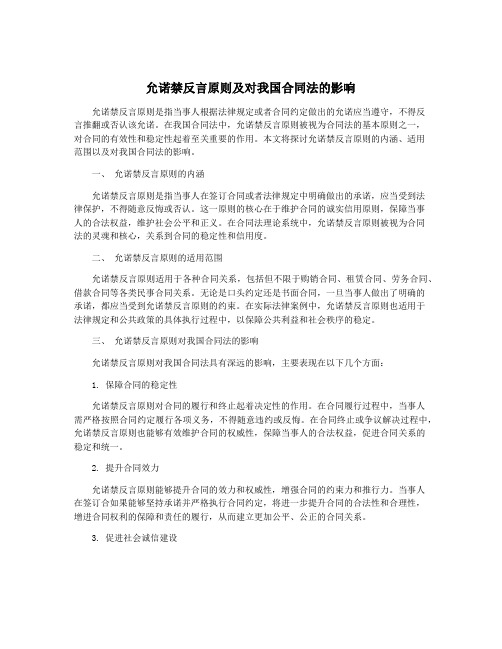
允诺禁反言原则及对我国合同法的影响允诺禁反言原则是指当事人根据法律规定或者合同约定做出的允诺应当遵守,不得反言推翻或否认该允诺。
在我国合同法中,允诺禁反言原则被视为合同法的基本原则之一,对合同的有效性和稳定性起着至关重要的作用。
本文将探讨允诺禁反言原则的内涵、适用范围以及对我国合同法的影响。
一、允诺禁反言原则的内涵允诺禁反言原则是指当事人在签订合同或者法律规定中明确做出的承诺,应当受到法律保护,不得随意反悔或否认。
这一原则的核心在于维护合同的诚实信用原则,保障当事人的合法权益,维护社会公平和正义。
在合同法理论系统中,允诺禁反言原则被视为合同法的灵魂和核心,关系到合同的稳定性和信用度。
二、允诺禁反言原则的适用范围允诺禁反言原则适用于各种合同关系,包括但不限于购销合同、租赁合同、劳务合同、借款合同等各类民事合同关系。
无论是口头约定还是书面合同,一旦当事人做出了明确的承诺,都应当受到允诺禁反言原则的约束。
在实际法律案例中,允诺禁反言原则也适用于法律规定和公共政策的具体执行过程中,以保障公共利益和社会秩序的稳定。
三、允诺禁反言原则对我国合同法的影响允诺禁反言原则对我国合同法具有深远的影响,主要表现在以下几个方面:1. 保障合同的稳定性允诺禁反言原则对合同的履行和终止起着决定性的作用。
在合同履行过程中,当事人需严格按照合同约定履行各项义务,不得随意违约或反悔。
在合同终止或争议解决过程中,允诺禁反言原则也能够有效维护合同的权威性,保障当事人的合法权益,促进合同关系的稳定和统一。
2. 提升合同效力允诺禁反言原则能够提升合同的效力和权威性,增强合同的约束力和推行力。
当事人在签订合如果能够坚持承诺并严格执行合同约定,将进一步提升合同的合法性和合理性,增进合同权利的保障和责任的履行,从而建立更加公平、公正的合同关系。
3. 促进社会诚信建设允诺禁反言原则对促进社会诚信建设和行业规范起着积极的推动作用。
在合同交易中,如果当事人能够自觉遵守承诺,不随意反悔或否认,将有利于建立和谐的商业环境,推动公平竞争和诚信交易,促进社会诚信的建设和行业的规范化发展。
(国际法学专业论文)禁止反言在国际法中的适用问题研究
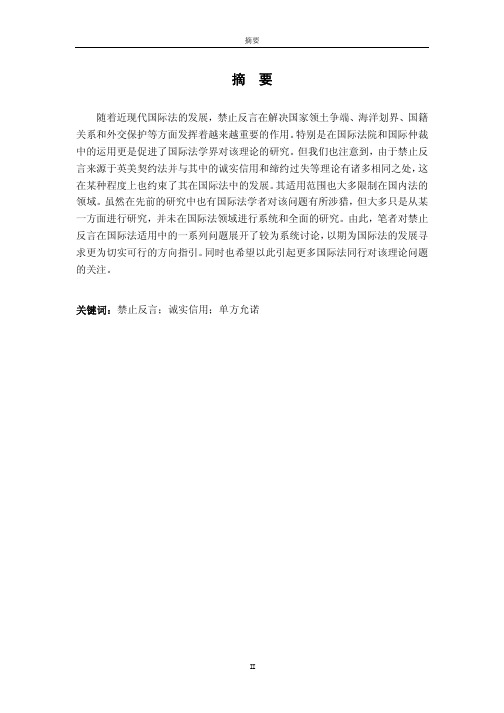
摘要摘要随着近现代国际法的发展,禁止反言在解决国家领土争端、海洋划界、国籍关系和外交保护等方面发挥着越来越重要的作用。
特别是在国际法院和国际仲裁中的运用更是促进了国际法学界对该理论的研究。
但我们也注意到,由于禁止反言来源于英美契约法并与其中的诚实信用和缔约过失等理论有诸多相同之处,这在某种程度上也约束了其在国际法中的发展。
其适用范围也大多限制在国内法的领域。
虽然在先前的研究中也有国际法学者对该问题有所涉猎,但大多只是从某一方面进行研究,并未在国际法领域进行系统和全面的研究。
由此,笔者对禁止反言在国际法适用中的一系列问题展开了较为系统讨论,以期为国际法的发展寻求更为切实可行的方向指引。
同时也希望以此引起更多国际法同行对该理论问题的关注。
关键词:禁止反言;诚实信用;单方允诺ABSTRACTABSTRACTWith the evolution of the modern international law, the principle of estoppels plays an increasingly important role in the resolution of territorial disputes between states, the maritime delimitation, the nationality matters and the diplomatic protection. In particular, its use in the practice of the international adjudication and arbitration has furthered the research of the field. Nevertheless, it’s also noted that that the theory which originated from the common contract law shares lots of similarities with the good faith theory and the fault in the making of the contract. has restrained the development of to a certain extent in the international law. Its application was also limited in the domain of the domestic law. Although some scholars of the international law in their research wrote of this question, no thorough and complete study was yet made. So this article discusses systematically the issues in the application of the principle of Estoppels in international law in order to advance its theoretical framework in the international law.Key word: Estoppels ; Good faith; Unilateral Promise学位论文独创性声明学位论文独创性声明本人声明所呈交的学位论文是本人在导师指导下进行的研究工作及取得的研究成果。
美国法上允诺禁反言之功能

浅析美国法上的允诺禁反言之功能摘要:本文致力于阐明美国法上允诺禁反言的存在理由及价值。
笔者主要从其适用范围入手,在阐述其适用范围逐渐扩大的基础上,结合我国合同法上的现有规定,认为:现今美国法上的允诺禁反言立足于补偿当事人的信赖利益,而信赖利益大量存在于合同磋商过程、订立过程、甚至履行过程,由于其以诚实信用原则为法理基础,其适用及有极大的弹性,所以,大陆法系的缔约过失责任只构成美国法上的允诺禁反言的功能的一部分。
关键词:允诺禁反言信赖利益缔约过失责任一、美国法上允诺禁反言的适用范围汉德法官曾建议,第90条①如果说有任何适用空间的话(他对此持怀疑态度),其都仅应被限制于捐献的或赠与的允诺。
吉尔摩将汉德法官的意见形象地描述为:专业选手应当根据专业规则进行比赛,在商业环境中,a向b发出一个要约,那么a对b的责任应当取决于要约、承诺和对价的正式规则,而不是依赖于其他规则。
②允诺禁反言原则在美国的早期法律适用主要集中在非商业领域,如家庭内的赠与、慈善捐款等。
二十世纪六十年代以来逐渐向商业领域渗透。
以下是美国法上允诺禁反言的主要适用范围:(一)无偿赠与性允诺无偿赠与性允诺包括有信赖损害的允诺和无信赖损害的允诺。
1.有信赖损害的赠与性允诺指由允诺人做出,受诺人对此产生信赖并因允诺人反悔而遭受损害的允诺。
即使此类允诺没有对价支持,从公平正义的理念出发,也不能允许作出该允诺的人对自己的允诺反悔。
这是允诺禁反言原则在美国适用的最初情形,法律以此来保护一方因信赖而导致的实际损害。
允诺禁反言原则在这种情形下适用,需满足以下四个要件:一、允诺人明确做出了允诺;二、受诺人对此产生了信赖;三、允诺人有理由期待信赖会发生;四、需强制执行允诺方能避免不公平。
2.无信赖损害的赠与性允诺允诺禁反言原则适用的此类情形是指由允诺人事后反悔已做出的允诺,虽未给受诺人造成实质损害,但以诚实信用或公序良俗原则允诺人也不得反悔。
该类允诺主要包括慈善性捐助和婚姻上之财产赠与或和解。
“间接禁反言”原则及其发展
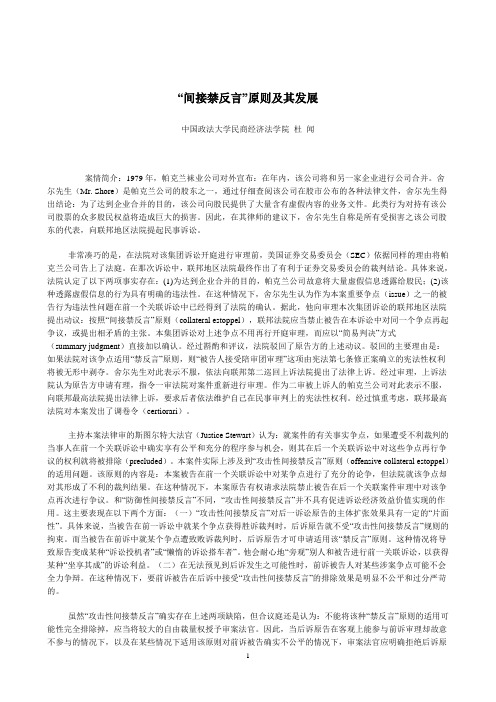
“间接禁反言”原则及其发展中国政法大学民商经济法学院杜闻案情简介:1979年,帕克兰袜业公司对外宣布:在年内,该公司将和另一家企业进行公司合并。
舍尔先生(Mr. Shore)是帕克兰公司的股东之一,通过仔细查阅该公司在股市公布的各种法律文件,舍尔先生得出结论:为了达到企业合并的目的,该公司向股民提供了大量含有虚假内容的业务文件。
此类行为对持有该公司股票的众多股民权益将造成巨大的损害。
因此,在其律师的建议下,舍尔先生自称是所有受损害之该公司股东的代表,向联邦地区法院提起民事诉讼。
非常凑巧的是,在法院对该集团诉讼开庭进行审理前,美国证券交易委员会(SEC)依据同样的理由将帕克兰公司告上了法庭。
在那次诉讼中,联邦地区法院最终作出了有利于证券交易委员会的裁判结论。
具体来说,法院认定了以下两项事实存在:(1)为达到企业合并的目的,帕克兰公司故意将大量虚假信息透露给股民;(2)该种透露虚假信息的行为具有明确的违法性。
在这种情况下,舍尔先生认为作为本案重要争点(issue)之一的被告行为违法性问题在前一个关联诉讼中已经得到了法院的确认。
据此,他向审理本次集团诉讼的联邦地区法院提出动议:按照“间接禁反言”原则(collateral estoppel),联邦法院应当禁止被告在本诉讼中对同一个争点再起争议,或提出相矛盾的主张。
本集团诉讼对上述争点不用再行开庭审理,而应以“简易判决”方式(summary judgment)直接加以确认。
经过斟酌和评议,法院驳回了原告方的上述动议。
驳回的主要理由是:如果法院对该争点适用“禁反言”原则,则“被告人接受陪审团审理”这项由宪法第七条修正案确立的宪法性权利将被无形中剥夺。
舍尔先生对此表示不服,依法向联邦第二巡回上诉法院提出了法律上诉。
经过审理,上诉法院认为原告方申请有理,指令一审法院对案件重新进行审理。
作为二审被上诉人的帕克兰公司对此表示不服,向联邦最高法院提出法律上诉,要求后者依法维护自己在民事审判上的宪法性权利。
崔某某诉丰县人民政府行政允诺案
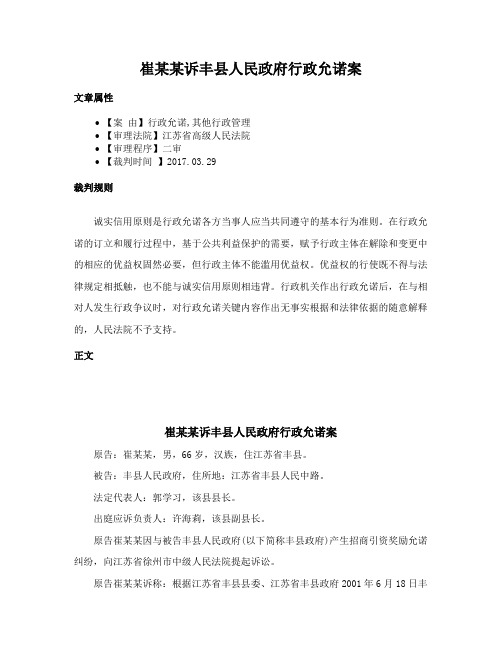
崔某某诉丰县人民政府行政允诺案文章属性•【案由】行政允诺,其他行政管理•【审理法院】江苏省高级人民法院•【审理程序】二审•【裁判时间】2017.03.29裁判规则诚实信用原则是行政允诺各方当事人应当共同遵守的基本行为准则。
在行政允诺的订立和履行过程中,基于公共利益保护的需要,赋予行政主体在解除和变更中的相应的优益权固然必要,但行政主体不能滥用优益权。
优益权的行使既不得与法律规定相抵触,也不能与诚实信用原则相违背。
行政机关作出行政允诺后,在与相对人发生行政争议时,对行政允诺关键内容作出无事实根据和法律依据的随意解释的,人民法院不予支持。
正文崔某某诉丰县人民政府行政允诺案原告:崔某某,男,66岁,汉族,住江苏省丰县。
被告:丰县人民政府,住所地:江苏省丰县人民中路。
法定代表人:郭学习,该县县长。
出庭应诉负责人:许海莉,该县副县长。
原告崔某某因与被告丰县人民政府(以下简称丰县政府)产生招商引资奖励允诺纠纷,向江苏省徐州市中级人民法院提起诉讼。
原告崔某某诉称:根据江苏省丰县县委、江苏省丰县政府2001年6月18日丰委发[2001]23号《关于印发丰县招商引资优惠政策的通知》(以下简称《23号通知》)的精神和承诺,崔某某从2003年初起就积极为丰县招商引资,经过多方奔走,四处联络,最终为丰县引进并建成投产了徐州康达环保水务有限公司(以下简称徐州康达公司),该项目总投资额6733.9万元,为丰县经济社会发展做出了积极贡献,并带动和提高了相关人员参与招商引资工作的积极性,起到了良好的示范作用,用实际行动兑现了对丰县政府的庄严承诺。
在崔某某长期从未间断的要求下,丰县政府却拒不履行自己的承诺,违背诚信,失信于民。
为切实保障崔某某应有的权益,特提起诉讼,要求丰县政府支付所欠奖金140万元。
被告丰县政府辩称:一、本案不属于行政诉讼受案范围,依法应驳回原告的起诉。
原告崔某某据以提起诉讼的根据是《23号通知》,该政策在民法上应该属于一种要约或者要约邀请,从原告诉求的理由和依据的事实看,原告与丰县政府之间产生的是民事权利义务关系,而不是行政管理或行政奖励关系。
行政允诺案例
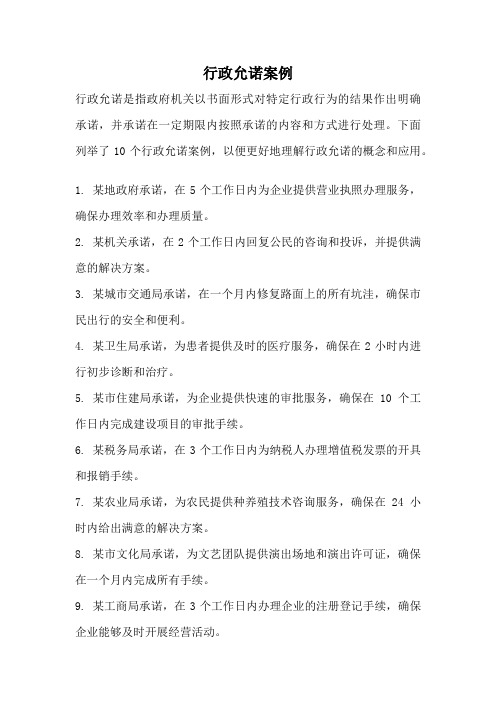
行政允诺案例
行政允诺是指政府机关以书面形式对特定行政行为的结果作出明确承诺,并承诺在一定期限内按照承诺的内容和方式进行处理。
下面列举了10个行政允诺案例,以便更好地理解行政允诺的概念和应用。
1. 某地政府承诺,在5个工作日内为企业提供营业执照办理服务,确保办理效率和办理质量。
2. 某机关承诺,在2个工作日内回复公民的咨询和投诉,并提供满意的解决方案。
3. 某城市交通局承诺,在一个月内修复路面上的所有坑洼,确保市民出行的安全和便利。
4. 某卫生局承诺,为患者提供及时的医疗服务,确保在2小时内进行初步诊断和治疗。
5. 某市住建局承诺,为企业提供快速的审批服务,确保在10个工作日内完成建设项目的审批手续。
6. 某税务局承诺,在3个工作日内为纳税人办理增值税发票的开具和报销手续。
7. 某农业局承诺,为农民提供种养殖技术咨询服务,确保在24小时内给出满意的解决方案。
8. 某市文化局承诺,为文艺团队提供演出场地和演出许可证,确保在一个月内完成所有手续。
9. 某工商局承诺,在3个工作日内办理企业的注册登记手续,确保企业能够及时开展经营活动。
10. 某市环保局承诺,为市民提供环境监测报告,确保在7个工作日内完成监测和报告的发布。
这些案例展示了行政允诺在不同领域的应用,涵盖了政府机关的各项职责和服务内容。
行政允诺的出现,有助于提高政府行政效能,减少行政不确定性,增强社会公信力,推动政府机关向更加透明、高效和服务化的方向发展。
- 1、下载文档前请自行甄别文档内容的完整性,平台不提供额外的编辑、内容补充、找答案等附加服务。
- 2、"仅部分预览"的文档,不可在线预览部分如存在完整性等问题,可反馈申请退款(可完整预览的文档不适用该条件!)。
- 3、如文档侵犯您的权益,请联系客服反馈,我们会尽快为您处理(人工客服工作时间:9:00-18:30)。
Held (1.) that where parties enter into an arrangement which is intended to create legal relations between them and in pursuance of such arrangement one party makes a promise to the other which he knows will be acted on and which is in fact acted on by the promisee, the court will treat the promise as binding on the promisor to the extent that it will not allow him to act inconsistently with it even although the promise may not be supported by consideration in the strict sense and the effect of the arrangement made is to vary the terms of a contract under seal by one of less value; and
By a lease under seal dated September 24, 1937, the plaintiff company let to the defendant company (a subsidiary of the plaintiffs) a block of flats for a term of ninety-nine years from September 29, 1937, at a ground rent of 2,500l. a year. In the early part of 1940, owing to war conditions then prevailing, only a few of the flats in the block were let to tenants and it became apparent that the defendants would be unable to pay the rent reserved by the lease out of the rents of the flats. Discussions took place between the directors of the two companies, which were closely connected, and, as a result, on January 3, 1940, a letter was written by the plaintiffs to the defendants confirming that the ground rent of the premises would be reduced from 2,500l. to 1,250l. as from the beginning of the term. The defendants thereafter paid the reduced rent. By the beginning of 1945 all the flats were let but the defendants continued to pay only the reduced rent. In September, 1945, the plaintiffs wrote to the defendants claiming that rent was payable at the rate of 2,500l. a year and, subsequently, in order to determine the legal position, they initiated friendly proceedings in which they claimed the difference between rent at the rates of 2,500l. and 1,250l. for the quarters ending September 29 and December 25, 1945. By their defence the defendants pleaded that the agreement for the reduction of the ground rent operated during the whole term of the lease and, as alternatives, that the plaintiffs were estopped from demanding rent at the higher rate or had waived their right to do so down to the date of their letter of September 21, 1945.
(2.) that the arrangement made between the plaintiffs and the defendants in January, 1940, was one which fell within the above category and, accordingly, that the agreement for the reduction of the ground rent was binding on the plaintiff company, but that it only remained operative so long as the conditions giving rise to it continued to exist and that on their ceasing to do so in 1945 the plaintiffs were entitled to recover the ground rent claimed at the rate reserved by the lease.
ACTION tried by Denning J.
By a lease under seal made on September 24, 1937, the plaintiffs, Central London Property Trust Ld., granted to the defendants, High Trees House Ld., a subsidiary of the plaintiff company, a tenancy of a block of flats for the term of ninety-nine years from September 29, 1937, at a ground rent of 2,500l. a year. The block of flats was a new one and had not been fully occupied at the beginning of the war owing to the absence of people from London. With war conditions prevailing, it was apparent to those responsible that the rent reserved under the lease could not be paid out of the profits of the flats and, accordingly, discussions took place between the directors of the two companies concerned, which were closely associated, and an arrangement was made between them which was put into writing. On January 3, 1940, the plaintiffs wrote to the defendants in these terms, "we confirm the arrangement made between us by which the ground rent should be reduced as from the commencement of the lease to 1,250l. per annum," and on April 2, 1940, a confirmatory resolution to the same effect was passed by the plaintiff company. On March 20, 1941, a receiver was appointed by the debenture holders of the plaintiffs and on his death on February 28, 1944, his place was taken by his partner. The defendants paid the reduced rent from 1941 down to the beginning of 1945 by which time all the flats in the block were fully let, and continued to pay it thereafter. In September, 1945, the then receiver of the plaintiff company looked into the matter of the lease and ascertained that the rent actually reserved by it was 2,500l. On September 21, 1945, he wrote to the defendants saying that rent must be paid at the full rate and claiming that arrears amounting to 7,916l. were due. Subsequently, he instituted the present friendly proceedings to test the legal position in regard to the rate at which rent was payable. In the action the plaintiffs sought to recover 625l., being the amount represented by the difference between rent at the rate of 2,500l. and 1,250l. per annum for the quarters ending September 29, and December 25, 1945. By their defence the defendants pleaded (1.) that the letter of January 3, 1940, constituted an agreement that the rent reserved should be 1,250l. only, and that such agreement related to the whole term of the lease, (2.) they pleaded in the alternative that the plaintiff company were estopped from alleging that the rent exceeded 1,250l. per annum and (3.) as a further alternative, that by failing to demand rent in excess of 1,250l. before their letter of September 21, 1945 (received by the defendants on September 24), they had waived their rights in respect of any rent, in excess of that at the rate of 1,250l., which had accrued up to September 24, 1945.
